
Mendive. Revista de Educación, April-june 2020; 18(2):288-301
Translated from the original in Spanish
Identifying values in a public university
Identificando valores en una universidad pública
Identificação de valores numa universidade pública
María Yesica Xicoténcatl Félix1, Gladys Hernández Romero1
1Universidad Juárez Autónoma de Tabasco. México. ORCID: http://orcid.org/0000-0002-5609-6289, http://orcid.org/0000-0002-9045-2937. E-Mail: yesix.26@gmail.com, gladiolita6@hotmail.com
Received: December 29th, 2019
Accepted: March 5th, 2020
ABSTRACT
Nowadays the knowledge society demands to have excellent professionals in the practice of values. This is why universities have an obligation to train upstanding students, capable to perform with responsibility and competition. The main objective of this work was to know the most important value in the life of a university student and its frequency in practice, where they forget it, also to identify how the university and its teachers promote values. Furthermore, in the study, the instrument was a questionnaire applied to 193 first-cycle students in the Administration degree at Academic Division of Administrative Economic Sciences of a public university in the state of Tabasco, a quantitative type investigation was used. Likewise, in the data obtained was shown that students know and possess values considered of high influence for their development and put into practice among classmates and teachers, also among the most important findings are the presence of fifteen values that are indicated as the most practiced in the university and its teachers to transmit an integral formation due to in this public educational institution they have professors with a correct performance and permanent ethics, examples inside and outside the institution maintaining mutual respect between teacher and student. However, a place of learning should always consider to enrich with talks towards university students about the importance of moral and ethical values to maintain a good edification of these and developing an intellectual, emotional and cultural growth to generate a positive impact to the society.
Keywords: ethics; moral education; Higher Education.
RESUMEN
En la actualidad la sociedad del conocimiento demanda disponer de excelentes profesionales en la práctica de valores. Es por esto que las universidades tienen la obligación de formar a estudiantes íntegros, competentes que sean capaces de desempeñarse con responsabilidad. El objetivo principal de este trabajo fue conocer el valor más importante en la vida de un universitario y su frecuencia en la práctica donde lo forjan; también identificar cómo promueven la universidad y sus docentes los valores. Asimismo, en el estudio, el instrumento fue un cuestionario aplicado a 193 estudiantes de primer ciclo en la carrera de Administración en la División Académica de Ciencias Económico-Administrativas de una universidad pública del estado de Tabasco; se utilizó una investigación del tipo cuantitativo. Igualmente, en los datos obtenidos se mostró que los alumnos conocen y poseen valores considerados de gran influencia para su desarrollo y puestos en práctica entre los compañeros y docentes. Entre los hallazgos más importantes se encuentran la presencia de quince valores que son señalados como los más practicados en la universidad y sus maestros para transmitir una formación integral, ya que en este centro de enseñanza pública disponen de profesores con un correcto desempeño y ética permanente, ejemplos dentro y fuera de la institución manteniendo respeto mutuo entre profesor y alumno. Sin embargo, un lugar de aprendizaje siempre debe considerar enriquecer con pláticas hacia los estudiantes universitarios acerca de la importancia de los valores morales y éticos para mantener una buena edificación de estos y desarrollando un crecimiento intelectual, emocional y cultural para generar un impacto positivo hacia la sociedad.
Palabras clave: educación moral; ética; Enseñanza Superior.
RESUMO
A sociedade do conhecimento actual exige excelentes profissionais na prática dos valores. É por isto que as universidades têm a obrigatoriedade de formar estudantes íntegros, competentes e capazes de desempenharem as suas funções com responsabilidade. O principal objectivo deste trabalho era conhecer o valor mais importante na vida de um estudante universitário e a sua frequência na prática onde é forjado; também identificar a forma como a universidade e os seus professores promovem valores. Do mesmo modo, no estudo, o instrumento foi um questionário aplicado a 193 estudantes do primeiro Ciclo da carreira de Administração na Divisão Académica de Ciências Económico-Administrativas de uma universidade pública do Estado de Tabasco; foi aplicada uma investigação quantitativa. Do mesmo modo, os dados obtidos demonstraram que os estudantes conhecem e possuem valores considerados de grande influência para o seu desenvolvimento e implementação entre os seus pares e professores. Entre os resultados mais importantes está a presença de quinze valores que são apontados como os mais praticados na universidade e seus professores para transmitir uma formação integral, uma vez que nesta escola pública têm professores com um desempenho certo e uma ética permanente, exemplos dentro e fora da instituição mantendo o respeito mútuo entre professor e aluno. No entanto, um lugar de aprendizagem deve sempre considerar o enriquecimento com conversas com estudantes universitários sobre a importância dos valores morais e éticos para manter uma boa construção destes e desenvolver o crescimento intelectual, emocional e cultural para gerar um resultado positivo na sociedade.
INTRODUCTION
The issue of values is of great importance because it guides to individuals to live and perform it in a satisfactory manner to a set of people and to enjoy the surroundings in a human way, with the ability to choose and give a solution in a correct way and virtues that will be acquire .
Hodelín and Fuentes said (2014) that " ... the values are principles that allow us to guide our behavior according to realize ourselves as individuals. They are fundamental beliefs that help us to prefer, appreciate and choose one thing instead of another, or one behavior instead of another, they are also a source of satisfaction and fulfillment. They provide us with a guideline to formulate goals and purposes, personal or collective. "
However, it is important to note that the formation of a professional and academic knowledge acquired need to be accompanied by integrity, and have an identity for proper development and, thus, make a good decision making to resolve situations presented competently.
Felix and Felix (2016) suggest:
Professional training, in addition to referring to a set of scientific-technical, procedural and methodical knowledge must have a series of attitudinal, effective-emotional and value elements that, as a whole, allow the development of competencies, judgments and reasoning for an adequate decision-making that contribute to solving the different problems posed by the complex social reality.
With respect to the subject of study, thoughts concerning, to highlight authors to contribute to research were found. Avelino, Fierro and Acosta (2014) and Bustamante (2010) assured that, for the formation of the university student, education and values is of a vital importance.
The research was carried out with the purpose of knowing the most important value and its frequency in the life of university students, the place in which they are forged and, finally, the teaching and impulse provided by professors and the university. Nowadays we find new generations and useful ideologies.
Literature review
Values concept
When we talk about the value we are referring to a concept with different perspectives; There are different meanings depending on the branch of science that studies it.
Bustamante (2010) mention to that "Moral values are the highest estimates of human beings, are formed and developed in daily contact with others, with family, with groups of study and work, finally, in the society".
Iglesias, Cortés, Mur, Pérez and Aguilar (2010) point out that "Moral value is the core of spiritual values and regulates behavior expressed in the feeling of good, formation of principles, moral representations, guides behavior to moral progress, to humanism and the improvement of the human being ".
Then, with respect to the above, it is understood that they are developed with the treatment of other people, with the task to regulate the behavior of individuals and to choose or appreciate one thing or another for the continuous improvement of the human being and to be able, to live in harmony with society.
Education in values
Values are the mainstay in a family, but within education they are of a great importance for a comprehensive formation; it requires to be in a continuous and permanent way.
Bustamante (2010) mentions that " education in values is of vital importance for the development of comprehensive education for people, it is a permanent, continuous process, which encompasses all spheres of life, inserted into what is inherent in the family, the community where you live, in the study center, at work, in short, It is present at all times of life " .
An integral education is suitable for a complete training; within the educational context, the moral, scientific and methodological side must be involved. Thus, the student is oriented and motivated to improve his personality, creating future ethical professionals.
Education and values to university students
It is important to mention that university students should receive a complete education, academic background and moral education at home and school, In this way, they develop an identity integral identity; values are the impulse of the human being.
Avelino et al. (2014) mention that "for the formation of the university student, values education is an essential axis of their design to achieve the formation of a integral personality, which has at its base the values already acquired in their social relations the context in which it takes place, and the possibility of converting this learning into a projection of positive ways of action that are specified in citizen training".
Values are essential for proper development in youth of higher Education, They permit improvement in humanity; It is also is a wide education and with a firm integrity. For this reason, if a graduate does not use them, they will lack of good principles in the social environment.
An honorable student stands by aspects that integrate them and in an intentional way conducted activities or research field, creating a favorable change for proper personality to the time of exercising the profession are carried out.
Gonzalez and Cardentey (2016) advise that " education in values among college students is a systematic, multidimensional, integrated and intentional process that ensures the formation and development of personality of future professional; which is materialized through curricular, extracurricular, extension and research, education at work and throughout life . "
Moral acts in university students are related with professional ethics, and therefore require a teaching deeper according to the profession of the students and the ability to cope in the future in the society.
Iglesias et al. (2010) propose " ... that the values are directly linked to the ethics of the profession, which requires studying the content with a level of significance so that the student allows a professional performance according with the profession that will be carried out in society in which it develops … "
In addition, young university students must have a competent site that allows them to receive an adequate education; today society demands the development of future profession with excellent and integral knowledge.
Forming values at university
In institutions of Higher Education, there is the great concern about the academic formation way based on academic values; that it to say, universities consider it necessary to prepare students with the ability to acquire scientific knowledge and technological adding ethics and responsibility, to forge them with human quality to an improvement. Tam (2002), quoted in De los Rios, Millan Ruiz and Tirado (2015) states that "... the institutions of higher education must take care of the growth and development of students in a holistic sense, incorporating not only the intellectual growth, but also social, emotional and cultural development ".
As Dominguez points out (2014)
... universities in the world arises today, with impetuosity, the need to encourage young people to the formation of social and moral values that underpin social and professional performance, committed to the destiny of human betterment. This is a requirement for the survival of humanity and for the preservation of its material and spiritual culture, created throughout the evolution of its history.
It is a great challenge for institutions to merge moral, ethical and academic development in university students so that they achieve reasonable improvement. De los Ríos et al. (2015) says "The challenge of universities is taking this model of comprehensive training so that future professionals can interpret the circumstances with ethical criteria and work to achieve sustainable development."
Universities have the responsibility to contribute, in a significant way, to society and the country with a straight and honest formation in Higher Education; however, it is spent to develop productive individuals reflecting values in the society. In addition, visible positive changes are asked to the institutions, thus being promoters of culture.
Calvopiña, Chávez, Barba, Martinez and Guanoquiza (2017) express that "This indicates that the world changes, society demands universities that help build social change by working together; and it looks for the collaboration between groups, people, communities and individuals to achieve a true transformation of the culture that supports the improvement of the social fabric and that works for the collective and not for the individual".
However, to get the desired success in the universities, it is essential to have teachers who have academic excellence, attitude of service, moral and ethical behaviors resulted in students with better training and perception. During its development, youth receive as an example the person who instructs them with good or bad values.
MATERIAL AND METHODS
The work was performed at the Division of Economic and administrative Sciences from a prestigious public university placed in Villahermosa, Tabasco, Mexico.
Instrument
One applied questionnaire comprising twelve open questions and multiple options was applied, for their prior validation were used 25 printed pilot surveys to verify errors and misinterpretations, obtaining minor corrections.
Shows
The empirical study was based on an intentional sample or convenience to 19 3 students of first cycle, bachelor's degree in Business Administration, one of the four given careers in the Division of Administrative Economic Sciences -, with a total of 403 students of the career.
Process
The students themselves, who so voluntarily accepted to respond in classrooms and hallways of that institution, filled out the questionnaires. This instrument consists of a number of open questions and Multiple options and about the values that know the students , the most important in his life , the frequency in which they practice, where they consider to be forged ; teachers teach and set an example by applying values, and at university values are promoted . In addition, a measurement scale was used (always, usually, rarely and never).
Analysis of data
The following data were processed in two programs: Excel 2016 package of Office and a statistical program IBM SPSS Statistics 25 for Windows. In the first one, it is made the database and in the second one, data were imported illustrating the graphics necessary for a descriptive analysis.
RESULTS
Then, according to the methodology used, the results of the 193 surveys carried out in a public university are shown.
To start, from 193 surveys applied, 116 (60 %) of them were answered by the feminine gender and 77 (40 %) for men.
The first question was: Do you know the values? From 193 surveys, they responded to know it. Values are paramount is in people's lives, it is the behavior to trigger positive actions in life.
According to the responses obtained they were validated 82 four values, mostly repeated. D and they were acquired 54, of which 40 had a minimum assiduously among students, taking into consideration to 14 of them, as obtained more frequently. In Table 1, it can be seen.
Table 1. What values do you know?
2. What values do you know? |
Frequency |
Percentage |
Valid percentage |
Accumulated percentage |
RESPECT |
174 |
21.1 |
21.1 |
68.7 |
HONESTY |
125 |
15.2 |
15.2 |
33.9 |
RESPONSIBILITY |
105 |
12.7 |
12.7 |
81.4 |
TOLERANCE |
81 |
9.8 |
9.8 |
98.7 |
LOVE |
53 |
6.4 |
6.4 |
10.6 |
SOLIDARITY |
52 |
6.3 |
6.3 |
88.8 |
HUMILITY |
29 |
3.5 |
3.5 |
37.4 |
EQUALITY |
25 |
3.0 |
3.0 |
40.4 |
FRIENDSHIP |
24 |
2.9 |
2.9 |
4.1 |
LOYALTY |
19 |
2.3 |
2.3 |
44.5 |
EMPATHY |
17 |
2.1 |
2.1 |
15.7 |
JUSTICE |
15 |
1.8 |
1.8 |
42.2 |
AMIABILITY |
10 |
1.2 |
1.2 |
1.2 |
EQUITY |
9 |
1.1 |
1.1 |
16.9 |
Total |
738 |
90 .0 |
9 0.0 |
|
To continue, we obtained the result of 15 values in which three of them are the most prominent: the respect with 87 students , 42 students honesty and responsibility 26 young people.
Table 2. What value do you think is most important in your life?
|
Frequency |
Percentage |
Valid percentage |
Accumulated percentage |
RESPECT |
87 |
45.1 |
45.1 |
83.9 |
HONESTY |
42 |
21.8 |
21.8 |
27.5 |
RESPONSIBILITY |
26 |
13.5 |
13.5 |
97.4 |
HUMILITY |
13 |
6.7 |
6.7 |
34.2 |
LOVE |
9 |
4.7 |
4.7 |
5.7 |
LOYALTY |
4 |
2.1 |
2.1 |
37.8 |
EQUALITY |
two |
1.0 |
1.0 |
35.2 |
SOLIDARITY |
two |
1.0 |
1.0 |
98.4 |
TOLERANCE |
two |
1.0 |
1.0 |
99.5 |
AMIABILITY |
one |
0.5 |
0.5 |
0.5 |
FRIENDSHIP |
one |
0.5 |
0.5 |
1.0 |
JUSTICE |
one |
0.5 |
0.5 |
35.8 |
PEACE |
one |
0.5 |
0.5 |
38.3 |
PERSEVERANCE |
one |
0.5 |
0.5 |
38.9 |
COURAGE |
one |
0.5 |
0.5 |
100.0 |
Total |
193 |
100.0 |
100.0 |
|
In Figure 1, with respect to the previous question how often do you practice? , 50.8 % (98 students) always, 42. Five % (82) usually, 6.7 % (13) rarely and 0 % never. Orostegui, Lastre, Gaviria, and Madero (2015) determine that "For the human being it is important to assign priority to values, since they will have to define the co-society to express it in their coexistence through behavior." In addition, in this way maintain an environment in harmony.

Fig. 1- With what frequencies do you practice?
Regarding the result ¿in your Division, teachers teach values? The students answered 95
students usually, 72 always, 22 rarely and 4 ever. It can be seen in figure 2. Undoubtedly, a
university professor is a figure of honor for his student and he is not only in the classroom, but also at
all times, permanently committed to good ideals.
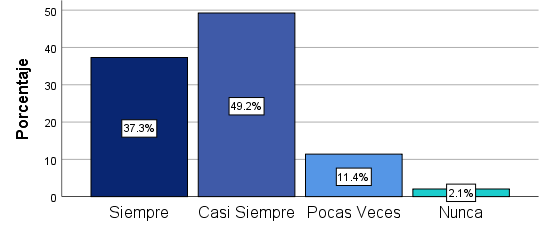
Fig. 2- In your Division, do your teachers teach you values?
95 students (49.2 %) answer usually, 64 students (33.2 %) always, that the teachers are an example applying the values inside and outside the classroom, while 34 young (17.6 %) rarely. Therefore, the teacher is considered a committed individual to educate continuously with values; he is an example to follow. Idea affirmed by Hodelín and Fuentes (2014): "It is not possible to educate in values if it is not a permanent example ..."
Then the question ¿In this university values are promoted in students? , They responded 77 students usually, 61 always and 55 rarely (Figure 3). Society requires universities ethical professionals. Orostegui, Lastre, Gaviria, and Madero (2015) state that "… The universities must have firm values and seek ethical attitudes among their members so that they can truly show a true positive impact on community development and responsibility towards nature and the cosmos".
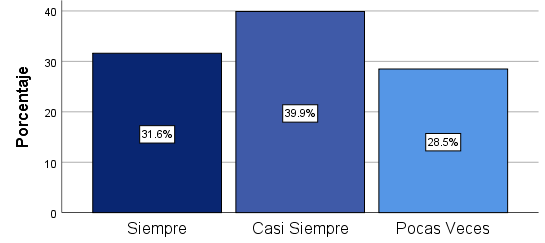
Fig. 3- In the university are values broken in the students?
The students assured values are forged at home, 177 students (91.7 %) was affirmed, 13 (6.7 %) considered in school and three (1.6 %) they mentioned with their friends, while that religion does not they considered it (figure 4). It is important to mention that the values begin within a family and to continue at different levels of education. Páez, Quintanilla and Álvarez (2015) affirm, "This process must begin in the family and extend with marked force to the educational institution where the student begins to appreciate and perceive basic feelings and values of group and social coexistence according to their years of lifetime".
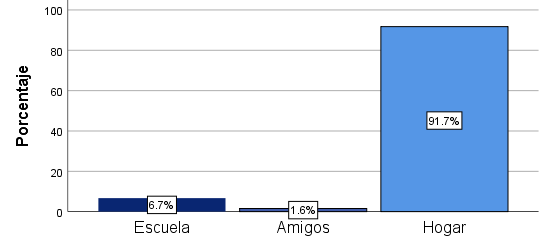
Fig. 4- Where do you think values are formed?
In the percentage of conferences and talks conducted at the university about values, 49.2 % (95 students) say rarely, 24.9 % (48) usually, 19.2 % (37) ever and 6.7 % (13) always. Universities are of great importance in values with different methods to achieve the desired success.
Following the question: ¿ Do you talk with your peers on the values of the university? , Answered 101 students rarely, 39 usually, and 19 long and 34 never.
¿Do you consider between you and your teammates practiced respect. ; 38.9 % (75 young people) usually, 29 % (56) rarely, 28.5 % (55) always, and 3.6 % (7) never (figure 5). Likewise, respect is essential between the same colleagues to maintain a harmonious environment. Calvopiña et al. (2017) express "... respect and dialogue as means of resolving the various conflicts that arise from living together in society."
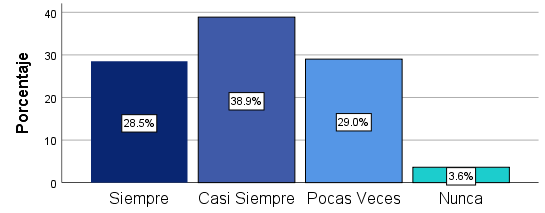
Fig. 5- Do you consider that respect is practiced between you and your colleagues?
Finally: Do you consider between you and your teachers practice respect? (Figure 6). 111 students answered always, usually 71 students, 10 young rarely and one never. Both must maintain the respect between teacher and student permanently. González (2002) points out that "... respect for the diversity of opinions and in which the teacher is an authority not imposed but earned by its exemplarity and condition as an educational model". Likewise, respect must be mutual.
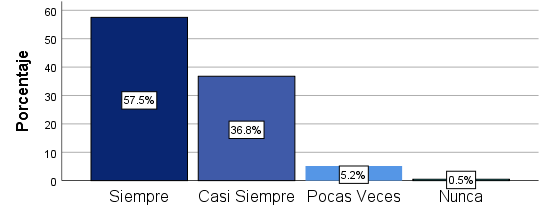
Fig. 6- Do you consider that respect is practiced between you and your teachers?
DISCUSSION
It is important to highlight academic training based on values; however, in the university stage must be a deeper attention, period used to prepare competent professionals.
Similarly, in Table 2, 193 university students mentioned fifteen most important values of their lives. Of which three stand out: with a higher percentage of 45.1 %,. Hildebrand (2004) assured to that "... respect is the mother of all virtues, for every virtue has in itself an updated response to the value of a particular sector of being, and then involves understanding and understanding of values. Honesty, 21.8 %. Páez et al. (2015) point out that "Honesty is that human quality by which the person is determined to choose to always act based on truth and true justice (giving each person his due, including itself)." The individual expresses himself, without lies or falsehood in the way. Moreover, responsibility, 13.5 %. Sosa, Espinosa, Corne, Corne, Reyes and Leal (2006) mention that "Responsibility is a value that is in the conscience of the person, which allows him to reflect, manage, guide and assess the consequences of his actions, always based in the moral ". In this sense, it encourages people to carry out activities generated by some act. With respect to Figure 1, we can see that 93.3 % always and almost always practice such values and with just 6.7 % rarely.
According to the figure 4, the 91.7 % believe that the values are forged at home. González, Cardentey and Labrador (2015) argue, "The formation of values is a continuous process that begins in the family and extends beyond the university." 6.7 % at school and 1.6 % with friends.
Subsequently, in figure 5, 67.4 % answered always and almost always, confirming the practice of respect among peers. Sandoval (2014) signaled, "Interacting with others in peace is the foundation of a democratic social coexistence, which constitutes in a learning that should be intentional from teaching practices, both in the classroom and outside it." Meanwhile the 32.6 % rarely and never practice it.
Moreover, in figure 6, 94.3 % always and usually practice respect between teacher and student. Gonzalez (2002) expresses that "A teacher-student communication centered on mutual respect, trust, authenticity in relationships conducive to the influence of the teacher as an educational model in the formation of values in their students." 5.7 % does not carry it out.
Based on the results obtained they must show that students in the Academic Division of Economic Sciences - Administrative known 54 values , whereas for most of them the most important value in life is respect; It can live in harmony with others and appreciate the efforts of others . Similarly, it managed to identify attachment for its practice in the daily work of young people. In addition, they apply respect among them to become people with extraordinary lives. However, honesty and equal responsibility are of great impact for young university students.
The students agree that the values are forged at home, where initiates the formation of individuals, nucleus in creating bonding between the same members, with the ability to create an identity. While, at least a minimum part considers students in school is ideal place for such purchase securities, considered a teaching site and where they spend a large part of the time, where they relate with friends, classmates and teachers.
Also states that at this public university, values are promoted but at the same time, it lacks to improve methods (talks, conferences, events) to encourage all students.
As a conclusion, this Higher Education institution has a great challenge; the integral formation of future teachers. For this reason , and related to the responses, in this highest seat of learning there are teachers responsible for developing students an ethical and moral right, maintaining a good permanent example inside and outside the institution , with the confidence to breathe tranquility and mutual respect between student-teacher .
BIBLIOGRAPHIC REFERENCES
Avelino, C. J., Fierro, B. M., y Acosta, H. (2014). El Desarrollo de los Valores en los Estudiantes de Ciencias de la Educación de la Universidad José Eduardo Dos Santos, Angola. Revista Científico-Pedagógica Atenas, 1(25), 127-139. Recuperado de https://www.redalyc.org/articulo.oa?id=478047201008
Bustamante, L. (2010). La educación en valores en trabajadores de la atención primaria de salud en Cuba. Revista Cubana de Medicina General Integral, 26(1), 138-146. Recuperado de http://scielo.sld.cu/scielo.php?script=sci_arttext&pid=S0864-21252010000100015&lng=es
Calvopiña, C., Chávez, C., Barba, A., Martínez, L. y Guanoquiza, W. (2017). Formación de Valores en la Educación Inclusiva en la Universidad Contemporánea. La Revista Didasc@lia: Didáctica y Educación, 8(4), 221-228. Recuperado de http://refcale.uleam.edu.ec/index.php/didascalia/article/view/2098/1076
De los Ríos, A. Millán, S.; Ruiz, M. Tirado, P. (2015). Los valores en el título de administración y dirección de empresas: un análisis de su importancia para estudiantes y egresados. Revista de Investigación Educativa, 33(2), 385-399. http://dx.doi.org/10.6018/rie.33.2.203251
Domínguez, L. (2014). La formación de valores en jóvenes universitarios. Revista de la Universidad de La Habana, (278), 108-118. Recuperado de http://scielo.sld.cu/scielo.php?script=sci_arttext&pid=S0253-92762014000200007&lng=es&tlng=es
Félix, V. y Félix, C. (2016). Valores éticos en la formación del estudiante de Psicología en la UAS. Revista Iberoamericana de las Ciencias Sociales y Humanísticas, 5(9). Recuperado de http://www.redalyc.org/articulo.oa?id=503954318004
González, V. (2002). El profesor universitario: ¿un facilitador o un orientador en la educación de valores? Revista Pedagogía Universitaria, 7(4). Recuperado de http://cvi.mes.edu.cu/peduniv/index.php/peduniv/article/view/230/222
González, R. Cardentey, J. y Labrador D. (2015). Las tecnologías educativas en el proceso formativo de valores en estudiantes universitarios. Revistas de Ciencias Médicas del Pinar Rio, 9(5), 868-876. Recuperado de http://www.revcmpinar.sld.cu/index.php/publicaciones/article/view/2163
González, R. y Cardentey, J. (2016). Educación en Valores Estudiantes Universitarios. Revista Humanidades Médicas, 16(1), 161-174. Recuperado de http://scielo.sld.cu/scielo.php?script=sci_arttext&pid=S1727-81202016000100011&lng=es&tlng=es
Hildebrand, D. (2004). La importancia del respeto en la educación. Revista Educación y Educadores, 7, 221-228. Recuperado en https://www.redalyc.org/articulo.oa?id=83400715
Hodelín, R. y Fuentes, D. (2014). El profesor universitario en la formación de valores. Revista Cubana de Educación Médica Superior, 28(1), 115-126. Recuperado de http://scielo.sld.cu/scielo.php?pid=S0864-21412014000100013&script=sci_arttext&tlng=pt
Iglesias, M., Cortés, M., Mur, N., Pérez, C. y Aguilar, M. J. (2010). La educación en valores en la Educación Superior. Revista Electrónica MediSur, 8(6), 1-5. Recuperado de http://www.redalyc.org/articulo.oa?id=180019985001
Orostegui, M., Lastre, G., Gaviria, G. y Madero, M. (2015). La Ética del Profesor Religada a la Formación en Valores del Estudiante. Mirada Teórica. Revista Educación y Humanismo, 17(29), 272-285. http://dx.doi.org/10.17081/eduhum.17.29.1257
Páez, M. C., Quintanilla, I. y Álvarez A.I. (2015). Actividades pedagógicas dirigidas a la educación del valor honestidad mediante la clase de Educación Física en la República de Cuba. Lecturas: Educación Física y Deportes, Revista Digital. Buenos Aires, 20(205). Recuperado de https://www.efdeportes.com/efd205/educacion-del-valor-honestidad-mediante-la-clase.htm
Sandoval, M. (2014). Convivencia y clima escolar: claves de la gestión del conocimiento. Revista Última Década, 41, 153-178. Recuperado de http://www.redalyc.org/articulo.oa?id=19536988007
Sosa, L. I., Espinosa, A., Corne, R., Corne, E., Reyes, M. y Leal, M. (2006). Acciones para reforzar los valores responsabilidad y humanismo en los futuros profesionales de la salud. Revista Educación Médica del Centro, 8(1), 96-110. Recuperado de http://www.revedumecentro.sld.cu/index.php/edumc/article/view/687
Conflict of interest:
Authors declare not to have any conflict of interest.
Authors´ Contribution:
Authors participated in the writting process of this article and in the analysis of documents.
![]()
This work is licensed under a Creative Commons Attribution-NonCommercial 4.0 International License.
Copyright (c)María Yesica Xicoténcatl
Félix, Gladys Hernández
Romero